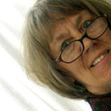Clutter and Meaning
My friend Martha remarked, on FB, that she was always impressed that when I drew my desk, it was neat. The thing is, I usually draw objects that I've put on the dining room table, not my desk, so it looks all nicely arranged. My actual desk looks like this today, and, typically, bears the evidence of many scattered projects in various states of completion: fleece from the quilt project; drawings and the lino block for a new relief print; calligraphy and drawing and painting tools; notes on a new photobook I'm designing, along with a sketch and some fountain pen tryouts; a can of fixative, Sumi ink and white gouche and a little bottle of drawing gum used as a resist in watercolor painting; a Square credit card reader for Phoenicia; my breakfast of Scottish oatmeal and coffee...and of course the computer.
About four months ago I made a decision to try to work at least half the day standing up. So there's a resolution made early that's already worked out pretty well. I think I work considerably more than half the time here at the tall adjustable drawing table I've had for thirty years, standing on an anti-fatigue mat. My blood sugar readings have been a little bit on the high-normal side for the past few years, and I'm hoping that less sitting, plus extra exercise and careful (non-holiday!) eating will keep that potential problem in check. It's hard to get enough exercise in a climate like this in the winter if you don't go to a gym, and it's also hard not to eat and drink too much in a deliciously food-centric city like Montreal. So, for the past three weeks, I've been walk/jogging/stair-climbing through the long hallways and basement of this big old industrial building three times a week, as well as my usual routine of stretches and calisthenics. I've only lost two of the six pounds I'd like to lose, but I feel better, except for the inevitable muscle aches and pains... What an annoyance it is to get older and have to think about this stuff! But we have to! I'm certainly grateful for the good health I've had most of my life, and want to do whatever I can to keep it, knowing we don't have control over a lot of what happens.
I always resolve not to make a list of resolutions, but do point myself in general directions like this, and the New Year represents is always a good time to take stock. A couple of blog-related tasks come to mind: to do a better back-up of Cassandra, and to improve my photo-management system, either cleaning up the mess of Picasa folders I've got now, or switching to a professional program. I'm really happy about the artwork progress in 2015, and want to continue that: drawing more people and animals, continuing to fill sketchbooks, as well as doing some larger easel paintings again. Reading is a given, and so is music, but it would be nice to touch the piano keys a little more often.
Still, all of these ideas merely skirt around the central questions of life and happiness: how to live with eyes and heart open within a world that is so tormented without getting depressed; how to get older gracefully and vibrantly; how to cultivate gratitude every day; how to be a kinder, gentler, ever-more-generous person while also taking care of one's own spirit and need for solitude, creativity, renewal; how to juggle our priorities and time and the needs of others clsoe to us; how to grow in love and awareness of the connectedness of everything. I don't think we can possibly make progress in these aspects of life without thinking about them and having a practice of reflection, anymore than we can keep our bodies in any sort of shape without conscious effort. Happiness is, I think, quite a relative thing, and not even a particularly useful term. I can't be "happy" when other people are suffering, but I'm also keenly aware of how beautiful life is, even when lived within significant limitations. What kind of person do I want to be when and if I reach 75, or 85, or even 90? What kind of person do I want to be if and when I have to deal with great grief, or the personal challenge of chronic or terminal illness? What makes someone the sort of person others want to be around, and what isolates others?
I don't have all the answers; I never will, but I know that a great deal of my emotional equilibrium depends on them. Isn't this why we read, and why we do creative work, and spiritual reflection, and why we enter into relationships, and why we get outside and look at nature and feel the wonder of our bodies moving and functioning in such intricate ways? Isn't every day, then, a new beginning, and a chance to find meaning in the apparent clutter of our complicated lives?




